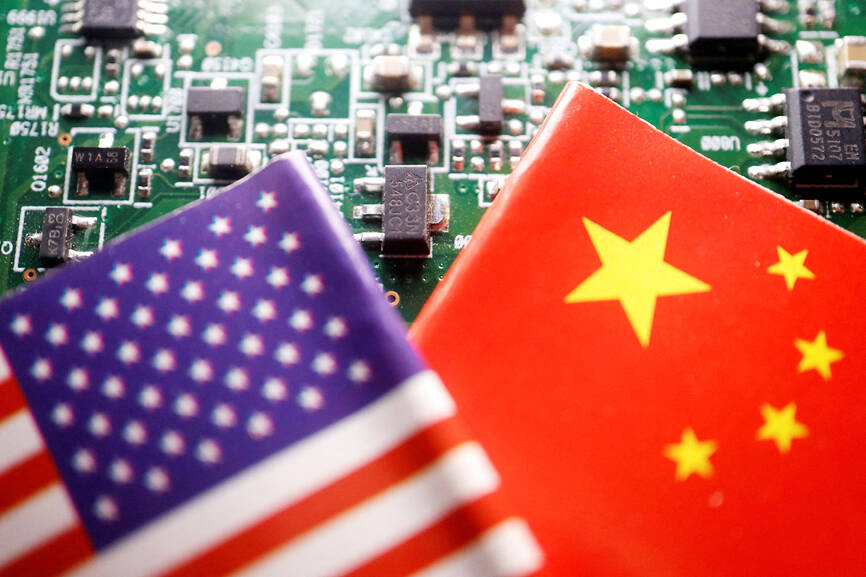China wants the US to ease export controls on chips critical for artificial intelligence (AI) as part of a trade deal before a possible summit between US President Donald Trump and Chinese President Xi Jinping (習近平), the Financial Times reported yesterday.
Chinese officials have told experts in Washington that Beijing wants the US to relax export restrictions on high-bandwidth memory (HBM) chips, the newspaper reported, citing unnamed people familiar with the matter.
HBM chips, which help perform data-intensive AI tasks quickly, are closely watched by investors due to their use alongside AI graphics processors, particularly Nvidia Corp’s.

Photo: Reuters
The FT said China is concerned because the US HBM controls hamper the ability of Chinese companies such as Huawei Technologies Co (華為) to develop their own AI chips.
Successive US administrations have curbed exports of advanced chips to China, looking to stymie Beijing’s AI and defense development.
While this has impacted US firms' ability to fully address booming demand from China, one of the world's largest semiconductor markets, it still remains an important revenue driver for American chipmakers.
Separately, a social media account affiliated with China’s state media yesterday said that Nvidia’s H20 chips pose security concerns for China, after Beijing raised concerns over backdoor access in those chips.
The H20 chips are also not technologically advanced or environmentally friendly, the account, Yuyuan Tantian (玉淵譚天), which is affiliated with Chinese state broadcaster CCTV, said in an article published on WeChat.
"When a type of chip is neither environmentally friendly, nor advanced, nor safe, as consumers, we certainly have the option not to buy it," the article concluded.
Yuyuan Tantian also said Nvidia chips could achieve functions including “remote shutdown” through a hardware “backdoor.”
Yuyuan Tantian’s comment followed criticism against Nvidia by the People’s Daily, another Chinese state media outlet.
In a commentary earlier this month, the People’s Daily said Nvidia must produce “convincing security proofs” to eliminate Chinese users’ worries over security risks in its chips and regain market trust.
Nvidia last week said its products had no “backdoors” that would allow remote access or control.

NEW IDENTITY: Known for its software, India has expanded into hardware, with its semiconductor industry growing from US$38bn in 2023 to US$45bn to US$50bn India on Saturday inaugurated its first semiconductor assembly and test facility, a milestone in the government’s push to reduce dependence on foreign chipmakers and stake a claim in a sector dominated by China. Indian Prime Minister Narendra Modi opened US firm Micron Technology Inc’s semiconductor assembly, test and packaging unit in his home state of Gujarat, hailing the “dawn of a new era” for India’s technology ambitions. “When young Indians look back in the future, they will see this decade as the turning point in our tech future,” Modi told the event, which was broadcast on his YouTube channel. The plant would convert

‘SEISMIC SHIFT’: The researcher forecast there would be about 1.1 billion mobile shipments this year, down from 1.26 billion the prior year and erasing years of gains The global smartphone market is expected to contract 12.9 percent this year due to the unprecedented memorychip shortage, marking “a crisis like no other,” researcher International Data Corp (IDC) said. The new forecast, a dramatic revision down from earlier estimates, gives the latest accounting of the ongoing memory crunch that is affecting every corner of the electronics industry. The demand for advanced memory to power artificial intelligence (AI) tasks has drained global supply until well into next year and jeopardizes the business model of many smartphone makers. IDC forecast about 1.1 billion mobile shipments this year, down from 1.26 billion the prior

People stand in a Pokemon store in Tokyo on Thursday. One of the world highest-grossing franchises is celebrated its 30th anniversary yesterday.

Zimbabwe’s ban on raw lithium exports is forcing Chinese miners to rethink their strategy, speeding up plans to process the metal locally instead of shipping it to China’s vast rechargeable battery industry. The country is Africa’s largest lithium producer and has one of the world’s largest reserves, according to the US Geological Survey (USGS). Zimbabwe already banned the export of lithium ore in 2022 and last year announced it would halt exports of lithium concentrates from January next year. However, on Wednesday it imposed the ban with immediate effect, leaving unclear what the lithium mining sector would do in the